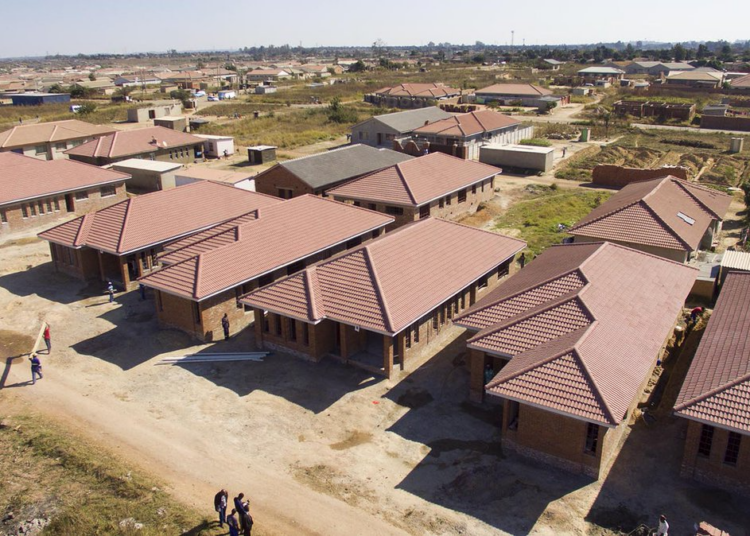LEADERSHIP findings revealed that, building sites all over the country are experiencing slow pace in construction as developers cannot procure cash to fund projects due to the cashless system and epileptic electronic banking system that is stalling transfer of funding for capital projects.
By and large, the action of the Central Bank of Nigeria (CBN) to create scarcity of the Naira notes and implement a redesign policy for the Naira with limited transactions via mobile banking platforms constitute gross economic loss in trillions of Naira in the real estate sector.
The policy has slowed activities in the sector analysts d also reduced market transactions as seen in shrinking sales, leasing and renting activities.
While activities at project sites have plummeted, new investors have adopted a wait-and-see attitude to investing while agents are watching as potential buyers and renters concern themselves more with immediate needs of life such as food and health.
However, some close market watchers argued that the new policy will turn out a positive development or an opportunity for the sector, saying that once the CBN is through with mopping up the old naira notes, there will be a rush for real estate products by way of investment.
This, according to them, is because there will be a lot of money at the disposal of deposit banks which they can lend to borrowers/ potential investors.
Confirming this to LEADERSHIP, REDAN auditor, and managing director of Roccio Carrillo, Mr. Emmanuel Oyelowo hinted that, the financing gap occasioned by the cash crunch policy had created wide margins and devastating effects to the real estate market, adding that, moratorium had been given to developers with construction loans.
He stressed that the cash crunch have depeleted the loans such that developers will need more time to deliver on the job due to unavailability of money in the system.
He also stated that developers were given deadlines to handover projects for commissioning and with the current cashless system. It will slow down their pace of delivery and this will have far-reaching effects on property renters. He averred.
He argued that the loans taken by developers for the purpose of construction finance to address housing deficit were already yielding high interest on the loans such that the multiplying effects would affect local investors in ways that they won’t be able to recoup back their capital investment by milestones.
Estate surveyor and valuer, Femi Oyedele differs. He said the new naira policy is already affecting the volume and rate of sale of building materials, adding that, block makers, cement, sand and gravel sellers and tradesmen collect cash for their sales and labour.
“The construction sector/building materials sub-sector is slowing down in performance until customers get used to cashless transactions like bank transfer which is still catching up at the moment,” he said.
“Real estate activities are done with a large chunk of money. A lot of the participants in the sector deal in cash. The effect on potential investors and buyers of real estate products is that it affects sales and letting of real estate. Sellers have to evolve new methods of selling properties,” he added.
Former chairman, Nigerian Institution of Estate Surveyors and Valuers, (NIESV) Lagos branch, Dotun Bamigbola, does not see much to worry about the new naira policy and real estate as most transactions these days are done electronically, he agrees there is a slowdown.
“There are areas of the building material sub-sector which may use cash in limited quantities when it comes to material retailing. Notwithstanding, the safe mode of payment preferred in the industry is electronic through the various individual sellers’ or retailers’ banks,” he said.
As a capital intensive sector and a major store of wealth and value, some market analysts had expected that the sector would provide a haven for investors with the old naira notes which the CBN is recalling from those who have them stashed in their houses.
But experts and players said, the sector is not an option for investing such old notes that are kept at home because most of them are proceeds of illicit transactions. They cited subsisting laws and regulations that go against such monies.
One of such laws is the new Anti-Money Laundering Act, which focuses mainly on real estate and discourages illicit money or unexplained wealth coming into the sector.
A Senior Advocate of Nigeria, Kayode Adeluola, also stated at a real estate forum in Lagos, that, the Act is aimed to ensure that illicit funds are not allowed to get into the financial systems or into the economy as it does not encourage criminals to continue to perpetuate their crimes wherever they may be.
Adeluola said, one of the easiest ways by which illicit funds get into the system is through real estate, adding that, a lot of people who commit crime such as banditry, kidnapping, and drugs peddling usually do not have an idea of how to spend their illicit income and so the easiest way is to buy real estate.
According to CEO of Global PFI, MKO Balogun, real estate does not provide a haven for illicit money. “It will still be traced; what CBN is doing is to find out the people hurting the economy by hoarding money,” he said.
This is even as the vice chairman of Nigerian Institution of Estate Surveyors and Valuers (NIESV), Lagos State branch, Gbenga Ismail said: “even though real estate will definitely be one of the investment options for those who hoard such money, the difficulty will be that any money received still has to be processed and banked.”
On his part, the CEO,, Estate Links Limited, Gbenga Olaniyan said, because of the amount of Naira involved and the difficulty in lodging, it is very difficult to accept cash for large ticket deals, wondering how, as a vendor or agent, one would lodge such money.





